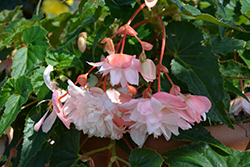Height: 10 inches
Spacing: 8 inches
Sunlight:
![]()
![]()
Hardiness Zone: (annual)
Group/Class: Tuberous Begonia Hybrid
Brand: Proven Winners
Description:
An outstanding trailing begonia with lovely deep green shiny leaves ; white double blooms with a blush of apricot-pink are produced throughout the season; grows well in humid conditions; great spiller for containers, or hanging baskets
Ornamental Features
Belleconia™ Apricot Blush Begonia features dainty nodding double white orchid-like flowers with peach streaks at the ends of the stems from mid spring to early fall. Its attractive serrated heart-shaped leaves emerge light green in spring, turning dark green in colour the rest of the year.
Landscape Attributes
Belleconia™ Apricot Blush Begonia is an herbaceous annual with a mounded form. Its medium texture blends into the garden, but can always be balanced by a couple of finer or coarser plants for an effective composition.
This is a high maintenance plant that will require regular care and upkeep, and usually looks its best without pruning, although it will tolerate pruning. Deer don't particularly care for this plant and will usually leave it alone in favor of tastier treats. Gardeners should be aware of the following characteristic(s) that may warrant special consideration;
- Insects
- Disease
Belleconia™ Apricot Blush Begonia is recommended for the following landscape applications;
- Mass Planting
- Border Edging
- General Garden Use
- Container Planting
- Hanging Baskets
Planting & Growing
Belleconia™ Apricot Blush Begonia will grow to be about 10 inches tall at maturity, with a spread of 12 inches. When grown in masses or used as a bedding plant, individual plants should be spaced approximately 8 inches apart. Its foliage tends to remain low and dense right to the ground. Although it's not a true annual, this plant can be expected to behave as an annual in our climate if left outdoors over the winter, usually needing replacement the following year. As such, gardeners should take into consideration that it will perform differently than it would in its native habitat.
This plant does best in partial shade to shade. It requires an evenly moist well-drained soil for optimal growth, but will die in standing water. It is not particular as to soil pH, but grows best in rich soils. It is somewhat tolerant of urban pollution, and will benefit from being planted in a relatively sheltered location. Consider applying a thick mulch around the root zone over the growing season to conserve soil moisture. This particular variety is an interspecific hybrid. It can be propagated by cuttings; however, as a cultivated variety, be aware that it may be subject to certain restrictions or prohibitions on propagation.
Belleconia™ Apricot Blush Begonia is a fine choice for the garden, but it is also a good selection for planting in outdoor containers and hanging baskets. It is often used as a 'filler' in the 'spiller-thriller-filler' container combination, providing a mass of flowers and foliage against which the thriller plants stand out. Note that when growing plants in outdoor containers and baskets, they may require more frequent waterings than they would in the yard or garden.
Disclaimer - This resource is provided for informational purposes only and does NOT reflect current availability. Inventory varies seasonally, so we cannot guarantee that every plant will be in stock at all times - please contact your favourite GardenWorks location directly for current availability. It does not include our entire inventory of plants, so be sure to visit GardenWorks to see varieties that may not be represented on this list.

